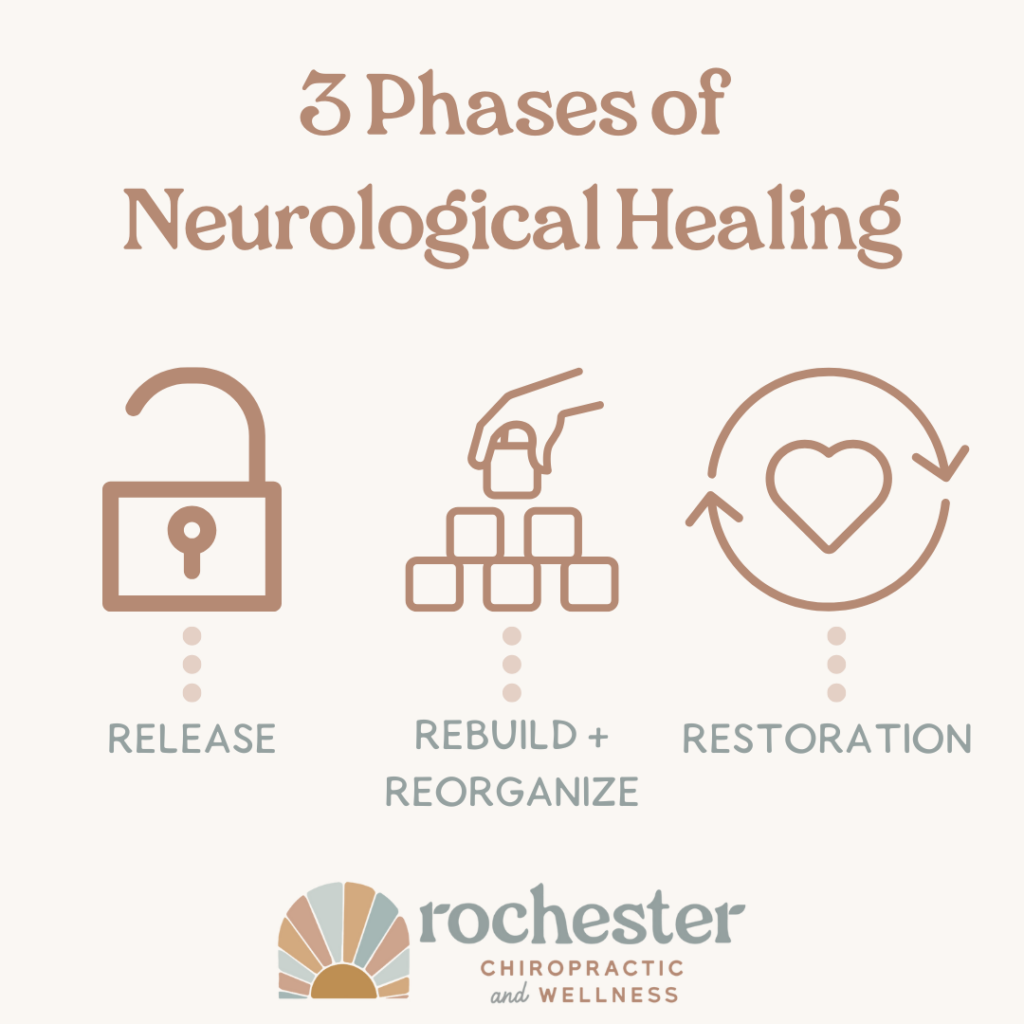WElcome TO
Explore our blog that focuses on holistic care for any and all ages - pediatric well-being, pre/post-natal health, and adult vitality.
THE BLOG

As a parent of a child with autism, you’ve likely found yourself wondering about those repetitive movements – the hand flapping, rocking, or specific sounds your child makes. Perhaps you’ve received well-meaning but misguided advice to suppress these behaviors or been told “they’ll grow out of it.”
Today, let’s explore the real root cause and deeper neurological story behind stimming that most healthcare providers miss, and how understanding it could transform your approach to supporting your child. Realizing how stimming connects to nervous system dysfunction reveals a powerful truth: addressing your child’s underlying sensory tension can help them and your whole family find relief.
The Hidden Purpose of Stimming
Let me share a story about a young girl who came to our clinic with repetitive nodding movements. Her mom noticed these movements would intensify when she felt stressed or anxious. Described how they seemed to help with the “butterflies in her stomach.” After unsuccessful medical interventions and facing the prospect of medication, her mother’s intuition told her there had to be another explanation.
Through advanced neurological scanning, called INSiGHT Scans, we discovered what many had missed – her nervous system was stuck in a state of stress and dysfunction, creating these movements as a vital self-regulation tool.
This discovery reflects a broader truth: stimming isn’t just a quirky behavior to eliminate – it’s your child’s nervous system attempting to find balance. Research shows that 80% of adults with autism report that stimming helps reduce their anxiety and provides essential calming effects. These movements serve as a coping mechanism for an overwhelmed nervous system stuck in nonstop sympathetic “fight or flight” mode.
The Science Behind the Movement
To truly understand stimming, we need to look at three key neurological factors:
- Autonomic Nervous System Imbalance: At the core of stimming lies a condition called dysautonomia. Where the sympathetic “fight or flight” system becomes overactive, while the parasympathetic “rest and digest” system is underactive. This imbalance leaves children stuck in a state of constant stress and sensory overload.
- Subluxation and Proprioception: A crucial piece of the puzzle involves something called subluxation. A combination of joint dysfunction and decreased proprioception (your body’s awareness of movement and position in space). When this system isn’t working optimally, it reduces the calming, regulating input your child’s brain needs. Stimming becomes their way of compensating for this deficit.
- Sensory Processing Connection: Subluxation, particularly in the upper cervical spine, can interfere with how the brain processes sensory information. This leads to sensory overload, prompting stimming as a self-soothing response. It’s your child’s creative solution to an overwhelming sensory world.
The Role of the Vagus Nerve
The vagus nerve plays a crucial role in this story. This important nerve helps activate the body’s “rest, regulate, and digest” functions. When it’s not functioning well due to nervous system stress, children can get stuck in fight-or-flight mode, leading to increased anxiety and repetitive behaviors.
A Natural Path Forward
While traditional approaches often focus on suppressing stimming, modern neuroscience shows us a better way. Through neurologically-focused care, we can:
- Regulate the Sensory Processing System: By addressing nervous system interference and restoring balance, we can help your child’s brain process sensory input more efficiently, naturally reducing the need for constant stimming.
- Support Emotional Regulation: When the nervous system is overwhelmed, children may struggle to manage emotions. Leading to increased stimming during moments of anxiety, frustration, or excitement. By addressing root causes, we can improve your child’s ability to self-regulate emotionally.
- Activate Natural Calming Responses: By supporting proper vagus nerve function, we can help activate your child’s natural calming responses. Reducing the constant state of fight-or-flight that often drives stimming behaviors.
While neurologically-focused chiropractic care isn’t aimed at eliminating stimming altogether, addressing the underlying nervous system stress can help reduce its frequency and intensity. Families often report that as their child’s nervous system becomes more regulated, they see improvements in:
- Sensory processing
- Emotional balance
- Overall quality of life
- Ability to engage in daily activities
- Communication and interaction
Moving Forward
Understanding stimming as a window into your child’s nervous system function can transform your approach to supporting their development. Rather than viewing it as a problem to fix, see it as valuable information – your child’s way of telling you their nervous system needs support. And we want to help!
Remember, every child’s journey is unique, but understanding these underlying neurological factors helps you become better equipped to make informed choices about supporting your child’s development and well-being. Your child’s stimming isn’t random – it’s purposeful. By addressing the root causes, we can help your child find better balance and thrive in their own unique way.


Neurological healing is no easy task. Nor is it normally a linear, straightforward path. In fact, it’s most commonly quite the opposite, going through multiple stages and phases on its way to optimal healing and outcomes.
The first challenge parents and patients face when trying to determine whether or not things are moving in the right direction with neurological healing is that the process is the stark contrast opposite of traditional medical treatment. Every single component of the medical system is designed not with healing in mind, but with suppressing, stopping, and shutting things down as the ultimate goal.
Have an infection? Kill it off with an antibiotic (which literally means anti-life).
Have a fever? Shut it off with a fever suppressor.
Have inflammation? Shut it down with steroid-based medications.
Have hyperactivity and impulsivity? Suppress it with stimulant medications.
Have anxiety? Cover it up and suppress it with drugs.
The medical way is one that is supposed to “work” fast and, therefore, be readily apparent. Unfortunately, parents today especially know that what we discussed is very true – the vast majority of the time, drugs and medications are doing nothing to address the actual root cause, create any actual healing, and they also come with a whole host of unwanted side effects.
So, what other options do we have? Well, if you’re reading this, then it’s likely that you’ve already begun to take the root cause of yours or your child’s challenges head on with neurologically-focused chiropractic care, or you’re strongly considering it and wondering exactly how that process works.
To make this super simple to understand, we’ll be breaking things down into three parts. First, the healing phases we’ll discuss are:
- Release Phase
- Rebuild + Reorganize Phase
- Restoration Phase

Phase 1 – Release
The first phase of neurological healing + restoration is often the bumpiest. The longer you have been subluxated and stuck in sympathetic dominance (dysautonomia), the deeper those stress patterns and dysfunctions set in. The body is doing all it can to adapt, but in the toughest of cases (Perfect Storm + Neuro Intensive ones especially), we generally find that the nervous system is just flat out worn out and exhausted.
Therefore, when you release those deep subluxation patterns in the first two (2) weeks to two (2) months of care, oftentimes, patients will experience some form of “neuro detox” where certain signs and symptoms may get a bit worse.
This is really no different than what happens when you get a fever, diarrhea, or traditional immune response – the body is actually getting “sick” to get well again.
So, in the vast majority of these neurological detoxes that occur way early in care, it’s actually a “good” sign that healing is happening. We’re getting the nervous system unstuck from the long-standing stuck, stressed, and exhausted subluxation patterns it’s been in.
Phase 2 – Rebuild + Reorganize
This is an exciting phase of care, and it’s really rooted in the science of something called neuroplasticity. Which honestly is what all of neurologically-focused chiropractic care is based upon.
Neuroplasticity, also known as neural plasticity or brain plasticity, is the ability of neural networks in the brain to change through growth and reorganization. It is when the brain is rewired to function in some way that differs from how it previously functioned.
Subluxation, dysautonomia, and the “Perfect Storm” are all what stop neuroplasticity, growth, and optimal development dead in its tracks and throw things off course. Therefore, when we hit this stage of care, and we start to see growth and reorganization happening again and a child getting back on track with their milestones and development – oh man, is it exciting!
What does rebuilding + reorganization look like practically? Check out the following list to spot the signs of this stage in progress:
- INSiGHT Scans shifting, changing, calming, clearing, and reorganizing
- Oftentimes this can be tracked with our “neurometrics” and scores
- Improved Neuro-Postural Patterns
- No more head tilt + rotation, shoulders relaxed and level, etc.
- Improved Neuromuscular Tone + Coordination
- Observed through movement, gait analysis, etc.
- Improved Neurological “Soft Signs”
- Sleeping better, eating better, improved digestion, better immune health, improvements in posture and coordination, etc.
- Improved Focus + Endurance in School, Therapy, etc.
- Being able to do more during therapy appointments and school
- Less Severe Subluxation Patterns and Adjusting Restrictions
- When things shift, move, and get easier to adjust
By no means does a child or patient need to experience everything on that list to be in this phase of neurological healing, as healing is unique to each individual. However, even observing and having just a couple of them means things are progressing and on the right track to optimal healing and neurological restoration!
Phase 3 – Restoration
This phase of care is the ultimate goal of our initial care plans, but honestly, it’s just the beginning of the best part – the child or patient is now experiencing a high quality of LIFE once again!
We feel strongly that we are designed to be strong, healthy, resilient, and happy, and therefore live a high quality of life as a result! This stage of care is when kids and patients really have had transformative changes with their health and day-to-day experience a quality of life far greater than what they had prior to starting chiropractic care.
This stage then sets the stage for wellness, but the work is not all the way done. In this stage, we want to stay on the job of neurological healing and continue to deploy neuroplastic healing principles in order to put “slack” and “stability” in the system.
This third state of neurological healing is essential for one reason – life goes on. Meaning kids are still going to have growth spurts, falls and injuries, colds and sickness to get through, social and emotional challenges, school, sports, seasonal changes, and so much more they still need to stay ahead of and adapt to. Adults are right there with them with work stressors, seasonal allergies, social engagements, and other physical stressors.
By completing this final stage of the neurological restoration care plan, we can then transition into lifetime wellness care with a strong, resilient, and more stable nervous system. A more stable nervous system can better withstand various regular life stressors and stay healthy and strong through them!
That is the ultimate goal we have for our patients – to not just get healthy for a season, but stay there for good! To do that, this third phase and achieving restoration is essential.
Diving Deeper into Neurological “Soft Signs” of Healing
While every single one of us, from the parent team to the provider team, wants to see massive changes and achievement of the big goals happen right away… science and clinical experience let us know that, typically, that is not the case.
So often, and so rightfully so, some of the most common examples parents have for BIG goals for their children’s care include things like starting to walk or talk, eliminating seizures or autism spectrum related challenges, improving focus and behavior, lessening anxiety and depression, and so forth. For the purpose of this article, we’ll refer to these functions as “brain-based” or “higher level” functions.
In contrast, more primary and basic neurophysiological functions that are essential to health are things like eating, sleeping, digestion (pooping), motor planning, respiratory + immune health, and so forth. These core health functions could also be called more primal or foundational components of health, and what many parents and providers don’t know is it’s these things that get offline and off track first, which then leads to the bigger “brain based” problems down the road as neurological function and development is compromised.
Therefore, on the road to optimal neurological healing, we often need to see changes with these “soft signs” (and scans), and the more basic physiological functions first.
- When a teen intensive patient struggling with anxiety, epilepsy, and exhaustion starts to finally fall asleep easier and stay asleep longer, we know we’re on the right track!
- When a three (3) year old patient recently diagnosed with autism and apraxia (nonverbal) begins experiencing better digestion, immune health, and gross motor planning, we know we’re on the road to recovery + restoration!
- When a grade schooler struggling with ADHD and behavioral regulation challenges has more relaxed shoulders, less tension, and gets adjusted easier, we know we’re making the right changes happen to their nervous system!
So often for parents, not seeing the big changes happen instantly with chiropractic care can be frustrating and, if we’re being honest, even disheartening. But when we can point out these incredibly important changes on their INSiGHT Scans and with their neurological “soft signs,” we can rebuild that hope and let you know we’re heading in the right direction!
If you have any questions at all about what phase of care your child is in (or yourself), do not hesitate to ask and really dig in with your doctor at the next visit. We love talking through this stuff with our patients, and always do our best to stay ahead of it, making sure you know what to look for and what to track as care progresses through each and every phase of care!


As a parent, you have probably experienced that sinking feeling. Sitting in yet another doctor’s office, watching the clock tick by as you wait with your uncomfortable or distressed child. When the appointment finally happens, it feels rushed. Your concerns are brushed aside, and you leave with another prescription – but no real answers.
You’re not alone in this frustrating journey. Many parents find themselves caught between traditional medicine’s quick-fix approach and the overwhelming world of alternative healthcare (chiropractic care, functional medicine, nutrition, etc.). The question remains: who can truly help your child thrive?
And even if you’re ready to start with chiropractic care and natural health, how do you find and choose the best practice that has the most advanced, effective clinical protocols and patient care process?
One thing that continues to amaze our patients in the best ways is how in-depth, detailed, and complete our clinical process is at Rochester Chiropractic and Wellness. So, if you’ve been looking for an incredible pediatric, perinatal, or family chiropractic office to serve your family at a high level, we are here to help!
A Different Kind of Healthcare Experience
We take pride in the fact that our approach digs deep to find the real causes behind your child’s challenges instead of just masking symptoms with medications. This is exactly why we developed our comprehensive 5-step clinical process.
Let’s break down how this impactful approach works:
1. The Deep-Dive Consultation
Unlike traditional rushed appointments, we begin with a thorough consultation that truly listens to your story. This isn’t just about checking boxes – it’s about understanding your child’s complete health journey. We explore patterns and connections that other healthcare providers might miss, asking questions that help uncover the real root of your child’s challenges. We then also take the time to explain everything, answer your questions, and walk you through exactly how neurologically-focused chiropractic care works.
2. Advanced Technology for Precise Understanding
Our state-of-the-art INSiGHT scanning technology allows us to evaluate the function of your child’s central and autonomic nervous system. These advanced scans identify areas of stress, tension, and dysfunction that might be contributing to their health challenges. They help pinpoint underlying issues such as subluxation, nervous system dysregulation, and dysautonomia. This isn’t just about symptoms – it’s about understanding how your child’s body is actually functioning. Based on the results, our team creates a fully customized care plan aimed at restoring optional nervous system function and improving overall health.
3. Personalized Care Planning
Cookie-cutter approaches don’t work when it comes to your child’s health. Using our exclusive care planning system, we create a fully customized approach based on:
- Your child’s specific health history and challenges
- Their unique INSiGHT scan results
- The duration and severity of their symptoms
4. Comprehensive Results Review
We believe in full transparency and education. During your Report of Findings, we:
- Review all findings in detail
- Clearly explain what’s causing your child’s challenges
- Outline a specific action plan for moving forward
- Take time to answer all your questions
5. Advanced Neurological Care
Our approach to care is as unique as your child. Instead of using a one-size-fits-all technique, we match our methods to your child’s specific needs. Our neurologically-focused adjustments are designed to:
- Release stuck stress and tension
- Address underlying nervous system imbalances (subluxation)
- Stimulate and activate the vagus nerve
- Promote natural healing and nervous system regulation without relying on medications
Your Child Deserves Better
The journey to better health shouldn’t leave you feeling confused, dismissed, or hopeless. Your instincts as a parent matter and your concerns deserve to be heard. At RCW, our comprehensive approach has helped thousands of families find answers and hope when other approaches have failed.
If you’re ready to experience healthcare that truly puts your child first, that takes the time to listen, and that works to address the real root causes of health challenges, we’re here to help. Please reach out to us today to schedule your initial consultation!
Your child deserves more than quick fixes and rushed appointments – they deserve a chance to truly thrive. Let’s work together to help your child achieve their full health potential, naturally and effectively.







